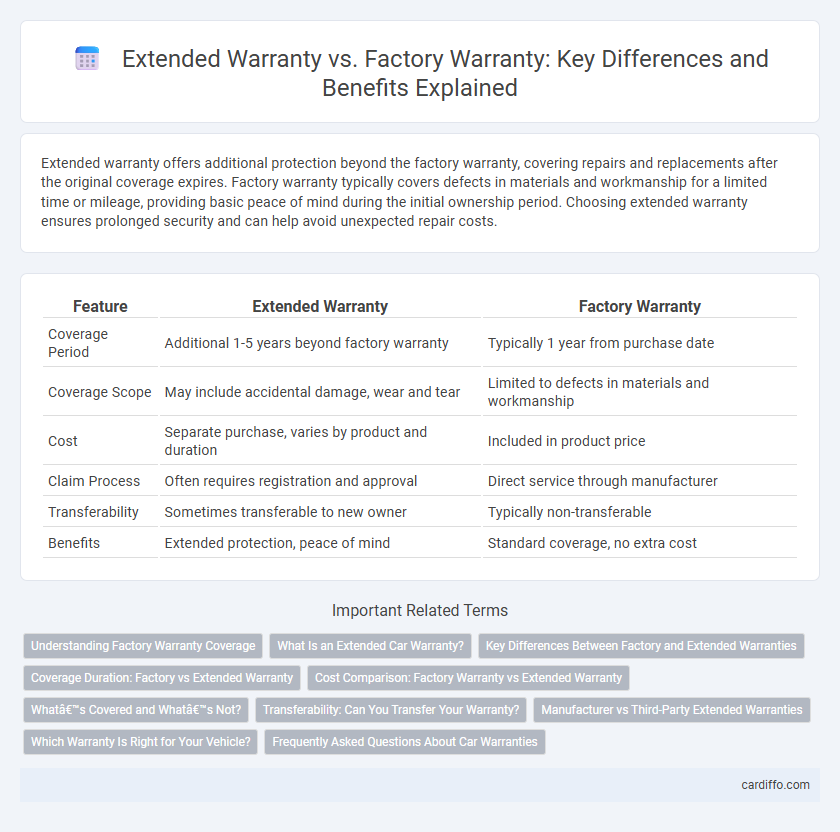Extended warranty offers additional protection beyond the factory warranty, covering repairs and replacements after the original coverage expires. Factory warranty typically covers defects in materials and workmanship for a limited time or mileage, providing basic peace of mind during the initial ownership period. Choosing extended warranty ensures prolonged security and can help avoid unexpected repair costs.
Table of Comparison
| Feature | Extended Warranty | Factory Warranty |
|---|---|---|
| Coverage Period | Additional 1-5 years beyond factory warranty | Typically 1 year from purchase date |
| Coverage Scope | May include accidental damage, wear and tear | Limited to defects in materials and workmanship |
| Cost | Separate purchase, varies by product and duration | Included in product price |
| Claim Process | Often requires registration and approval | Direct service through manufacturer |
| Transferability | Sometimes transferable to new owner | Typically non-transferable |
| Benefits | Extended protection, peace of mind | Standard coverage, no extra cost |
Understanding Factory Warranty Coverage
Factory warranty coverage typically includes repairs and defects arising from manufacturing errors, lasting for a predetermined period or mileage specified by the vehicle manufacturer. It often covers essential components such as the engine, transmission, and electrical systems, ensuring that any faults caused by production issues are repaired at no cost to the owner. Extended warranties offer additional protection beyond factory warranty terms, covering a broader range of parts and services but usually require a separate purchase.
What Is an Extended Car Warranty?
An extended car warranty is a service contract that prolongs coverage beyond the original factory warranty, offering protection against mechanical breakdowns and repairs after the initial warranty expires. Unlike factory warranties, which come standard with new vehicles and cover defects for a limited time or mileage, extended warranties can be purchased separately and tailored to specific needs or vehicle conditions. These plans often cover components such as the engine, transmission, and electrical systems, providing peace of mind and potential savings on costly repairs.
Key Differences Between Factory and Extended Warranties
Factory warranties typically cover repairs and defects for a limited period, often ranging from 1 to 3 years, with coverage provided directly by the manufacturer. Extended warranties offer prolonged protection beyond the factory warranty, usually through third-party providers, and may include additional services such as accidental damage or wear and tear coverage. Key differences include duration, coverage scope, cost, and the party responsible for service, with factory warranties generally offering standard, manufacturer-backed assurance and extended warranties providing customizable options for extended peace of mind.
Coverage Duration: Factory vs Extended Warranty
Factory warranties typically cover a product for a limited duration, often ranging from one to three years, providing protection against manufacturer defects. Extended warranties offer prolonged coverage beyond the factory warranty period, sometimes extending protection for several additional years. This extended duration helps safeguard consumers from costly repairs once the original warranty expires.
Cost Comparison: Factory Warranty vs Extended Warranty
Factory warranties generally come free with the purchase of a product and cover repairs for a limited period, typically one to two years. Extended warranties, purchased separately, extend coverage beyond the factory warranty but often cost between 10% to 20% of the product's original price, making them a significant additional investment. While factory warranties offer basic, cost-efficient protection, extended warranties provide prolonged security at a potentially higher total expense depending on the duration and scope of coverage.
What’s Covered and What’s Not?
Extended warranties typically cover repairs and replacements beyond the factory warranty period, including parts and labor for mechanical failures, but often exclude pre-existing conditions, wear-and-tear, and cosmetic damages. Factory warranties generally cover defects in materials and workmanship for a limited timeframe or mileage, providing protection against manufacturing faults but not user-inflicted damage or routine maintenance. Understanding specific terms and exclusions in both warranties is crucial for maximizing coverage and avoiding unexpected repair costs.
Transferability: Can You Transfer Your Warranty?
Factory warranties are typically non-transferable, binding coverage strictly to the original purchaser and expiring once the vehicle changes ownership. Extended warranties often offer transferability options, allowing subsequent owners to benefit from remaining coverage, which can enhance the vehicle's resale value. Understanding the terms of warranty transferability is crucial for both buyers and sellers to ensure continuous protection.
Manufacturer vs Third-Party Extended Warranties
Manufacturer warranties offer coverage directly from the product maker, ensuring genuine parts and service through authorized repair centers, typically covering defects for a limited period. Third-party extended warranties, sold by independent companies, can provide longer coverage and broader protection but may involve variable claim approval processes and potentially non-original parts. Consumers should evaluate the reliability, claim policies, and cost differences between manufacturer and third-party warranties to make an informed decision.
Which Warranty Is Right for Your Vehicle?
Extended warranties offer broader coverage beyond the factory warranty period, protecting against costly repairs after the original manufacturer's warranty expires. Factory warranties typically cover defects and repairs for a limited timeframe based on miles or years, generally providing reliable coverage for new vehicles. Choosing the right warranty depends on your vehicle's age, mileage, driving habits, and financial preference for avoiding unexpected repair costs.
Frequently Asked Questions About Car Warranties
Extended warranties offer additional coverage beyond the standard factory warranty, often covering repairs and services after the original warranty expires. Factory warranties typically cover manufacturer defects for a specific period or mileage, such as 3 years or 36,000 miles. Customers frequently ask about cost differences, coverage limits, and whether extended warranties transfer to new owners or cover routine maintenance.
Extended Warranty vs Factory Warranty Infographic

 cardiffo.com
cardiffo.com